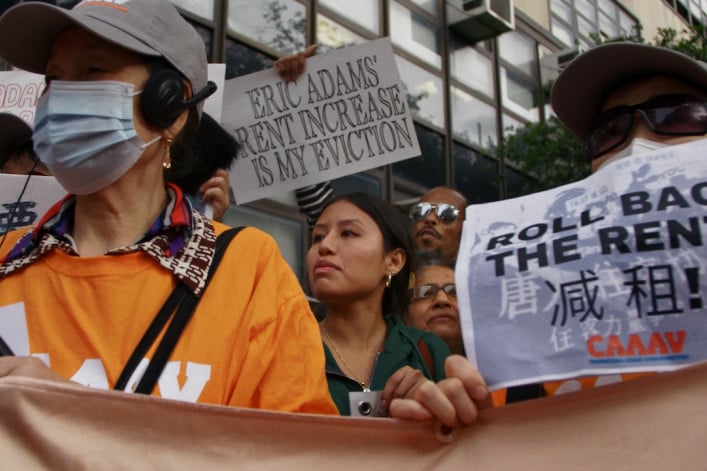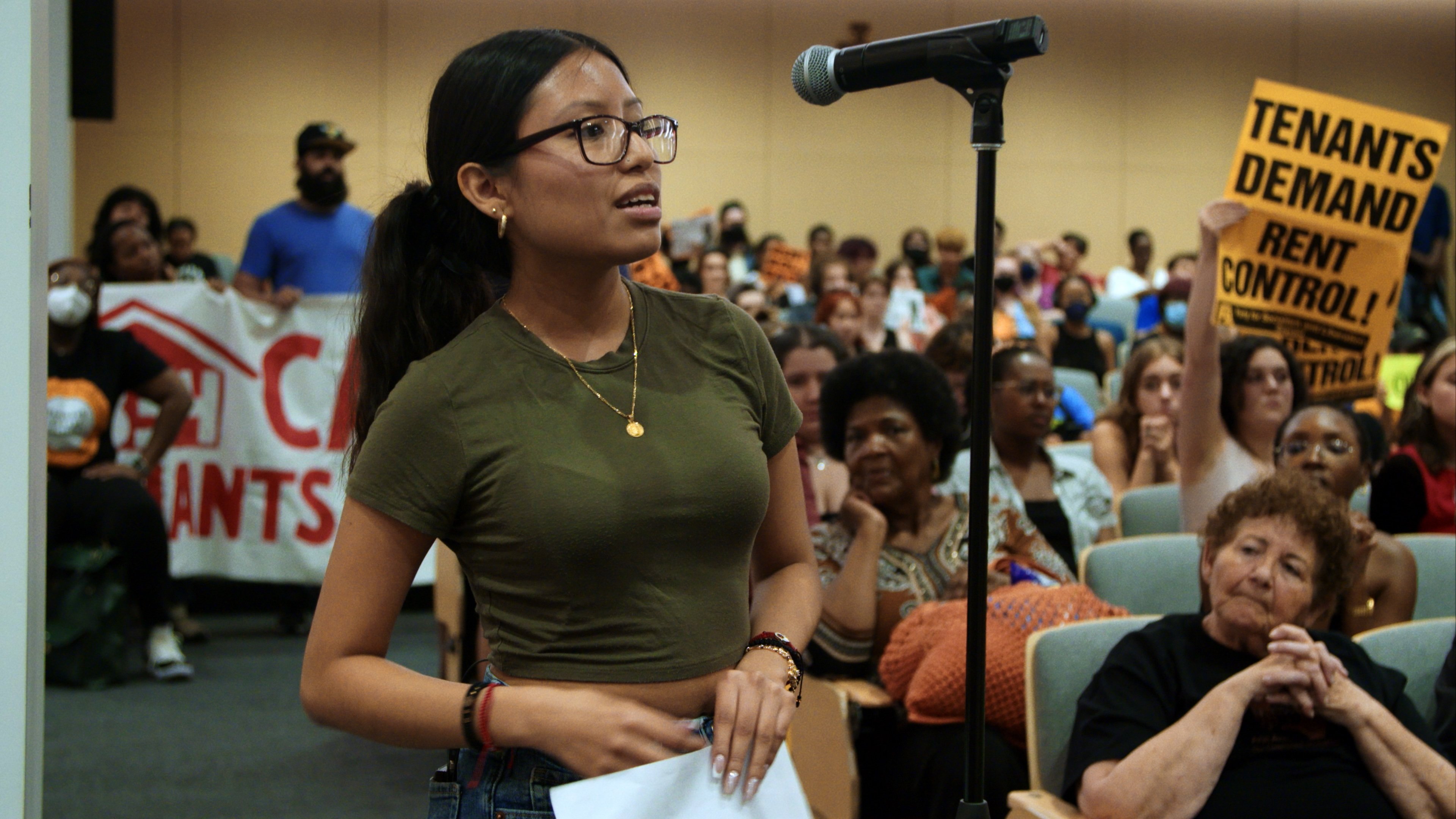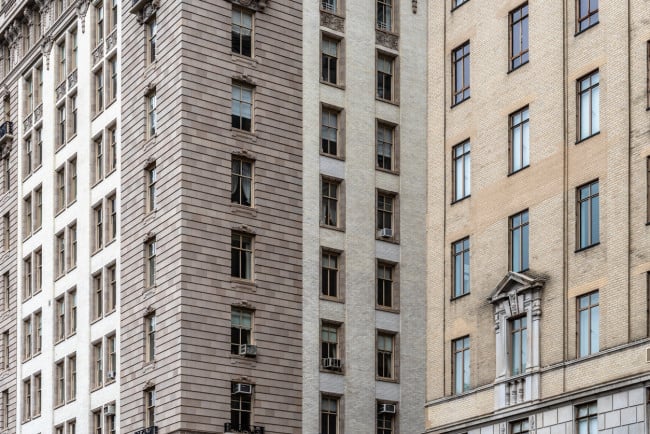I’ve testified at Rent Guidelines Board hearings since I was 11. Here’s why I won’t stop fighting for tenants’ rights
- Samantha Bravo’s family’s battle with their landlord is featured in the new documentary ‘Slumlord Millionaire’
- The documentary follows NYC tenants dealing with landlord harassment, deed theft, and gentrification

Samantha Bravo and CAAAV: Organizing Asian Communities rally at a Rent Guidelines Board hearing.
Courtesy of Slumlord Millionaire
Samantha Bravo has testified at every annual hearing of the Rent Guidelines Board (RGB), which sets rents for around a million rent-stabilized apartments in New York City, since she was just 11 years old.
Now a college student, Bravo began attending RGB meetings after her family started to experience harassment from their landlord, who entered their Sunset Park apartment without permission and refused to make repairs. Her parents and neighbors fought back: They joined community organizations to push for necessary renovations and addressed the annual RGB meeting to ask the board to keep their $1,200-per-month, two-bedroom apartment affordable.
“You've got the microphone and you get two minutes to speak, and they have to listen to what you say,” Bravo told Brick Underground. She found the experience empowering. “There really is a sense of community at the hearing.”
Bravo and her parents are a few of the New Yorkers featured in “Slumlord Millionaire,” a new documentary that explores NYC’s housing crisis. Ahead of the film’s premiere on PBS, Brick Underground caught up with Bravo to talk about her experience and advocacy for her fellow tenants.
“Slumlord Millionaire” premieres on PBS on Monday, July 28th at 10 p.m. Eastern Standard Time. This interview has been edited for length and clarity.
Tell us about yourself. What was it like to grow up in Sunset Park?
I've been living in Sunset Park for 20 years—my whole life. Everyone here is mostly Hispanic, so you're walking along streets and you're going to hear people speaking Spanish. My neighbors know me. I literally just ran into my neighbor today, and my mom too.
I went to middle school in Bay Ridge, high school in Bensonhurst, and for college I'm now going to Baruch in Manhattan. One of my hobbies is trying new food, so in this past year I've been discovering new places for dumplings, ramen, burgers—anything. I have a huge plushy collection, and I like coloring and drawing as well.
What’s your apartment like?
I’ve lived in the same apartment my whole life. It’s two bedrooms, one living room, a kitchen and a bathroom. The living room is very homey. It really is a living room, because we all stay there together and watch T.V.
I share a bedroom with my younger brother, so I have my space and he has his space. I have my plushies on the wall, and my brother has his plushies as well. We also have my cats, Noche and Mango, and a dog named Chloe. She’s a Yorkie mix.
Do you remember when the trouble with your landlord started?
When I was in middle school, I remember she barged into our apartment. She just started yelling and cursing my dad. I think that's probably one of the earliest memories I have. I was eating with my brother when we heard the screams and everything. He hid under the bed. It was a really tense situation. I remember the cops were called.
Repairs weren't being made. There was no heat and no hot water. We weren't sure what was going on, if this was okay, or what to do, until my mom saw a Neighbors Helping Neighbors flyer and decided to ask them. And then slowly, the tenant meetings started to happen in the hallway of our building. As the years passed, we grew stronger, we made an association, and then we got connected with TakeRoot Justice. And then that's when we decided to take legal action against our landlord.
What needed fixing?
There was mold in the bathroom. Instead of actually doing the proper repair she would just paint over it.
There was one instance where the bathroom ceiling fell. I didn't even know what happened until in the morning when I went to the bathroom and I looked up and there was no ceiling.
How did all of this impact your life outside of home?
I didn't talk to my friends about it. I felt like it was not something normal. I was very grateful to be living in the apartment, but I never wanted to talk about the situation that I was in.
Maybe if I did talk about it with my friends, I would have found out that they were going through even more difficult situations. Living in New York City, I wouldn't be surprised if they did.
You mentioned you want to be a child therapist after you graduate. Do you think this experience impacted who you want to be, and what you want to pursue in life?
I always remember my younger brother crawling under the bed. In his own home, he had to hide. Years later, when someone would knock on the door, he got scared. It definitely made me realize that if maybe there was support, my brother could have handled that differently. If I can be someone that can help a child get through an experience in the right way, I can help that child a lot.

Something you talk about in the documentary is how your parents were a role model for you by not moving out or giving up this fight, and inspiring you to testify in front of the RGB. What did you learn from them?
They always told me never stay quiet, especially if it's an unjust situation. We could have just gotten up and moved out, because that's an easy solution. But that's our home. My parents definitely taught me to have that spirit, to fight back and not let myself be pushed around.
Do you remember the first time you testified before the RGB?
I was a bit nervous, but I just spoke about my experiences. I didn’t want to be unable to go out because the rent was too high. I wanted to go to zoos, aquariums, museums — I wanted to do all the things girls my age were doing. From that meeting, I just never stopped. I think it's important that as many people as possible explain why they think that rent shouldn't increase.
I gave my testimony recently in June. I saw my brother and then another younger girl testify as well. It’s really nice to see, but at the same time, it's kind of disheartening, because it's crazy that young kids have to come and explain to a board of nine people why they shouldn't increase rent. It's empowering, but no child should be in that position.
If someone was in the same situation with a negligent landlord, what would you tell them to do?
Definitely go to a tenant organization that can guide you in the right direction. Speak to your neighbors about what's going on. Once you start creating like a community within your own building, it helps you. There's strength in numbers. And people offer different things. So maybe one person is the one that speaks out, and maybe there’s someone that has more knowledge about your rights. And know your rights, because knowledge is power.
When did things with your landlord start to get better?
Things started getting better my junior year, around the time the documentary started. We were much more knowledgeable about our rights. And we weren't afraid anymore to call out the things that needed to be done. We also had a lot of support from Take Root Justice, and knowing that we had legal support made things so much better. So repairs were being made, the heat and hot water was more consistent, and the landlord wasn't as disruptive.
And then finally, she sold the building. That's when things got much better. Our current landlord is nothing compared to our old landlord. A week ago, the vent in our bathroom was halfway falling, and my dad just sent him a text and he came in in less than two hours and fixed it. Now, I see my landlord and I actually say hello to him. It's mutual respect.
Brick Underground's Inside Stories features first-person accounts of dramatic, real-life New York City real estate experiences. Have a story to share? Drop us an email. We respect all requests for anonymity.
You Might Also Like




























